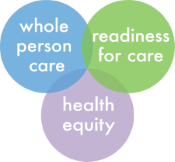is a community health model developed by Partners Behavioral Health Management:
Addressing Social Determinants of Health in Federally Qualified Health Centers:
Whole Person Care and Social Determinants of Health
July 23, 2019CAHA held the second in a series of education and networking events on July 23, 2019, to promote whole person care in the Greater Lansing Area. The series is intended to increase awareness and understanding of concepts and strategies that support whole person care.
Whole person care recognizes that many factors impact the health of an individual and the population, and that health and healthcare outcomes are greatly influenced by factors related to an individual’s social environment, physical environment and economic opportunity. Three presenters shared perspectives about these social determinants of health: Anne Barna, MA, Planning, Promotion and Evaluation Manager of the Barry Eaton District Health Department; Lisa Peacock, MSN, RN, WHNP-BC, Health Officer for the Health Department of Northwest Michigan and the Benzie-Leelanau District Health Department; and Anne Scott, MPH, Executive Director of Ingham Community Health Centers and Deputy Health Officer for the Ingham County Health Department.
Ms. Barna shared findings from the 2018 Community Needs Assessment, a triennial assessment conducted by the health departments for Clinton, Eaton and Ingham Counties. The assessment is used by the health departments, health systems and community organizations to identify priorities for community health improvement. The priorities emerging from the 2018 assessment are: Behavioral Health, Health Care Access and Quality, Obesity, Financial Stability and Economic Mobility, and Chronic Disease. In discussing findings related to social determinants of health, Ms. Barna indicated that while chronic disease is the main killer throughout the tri-county area, social conditions that promote health vary across the region. Because of that disparity, minorities, people of low income and other vulnerable populations are often less healthy. She also encouraged participants to use the assessment to learn more about the community’s health status and priorities. It can be accessed at:
https://www.healthycapitalcounties.org/ Ms. Peacock discussed a regional program in northwest Michigan, which was one of five regions selected as a Community Health Innovation Region for Michigan’s State Innovation Model project. The region is utilizing data from social determinants of health screenings and other sources to identify social conditions affecting health. Through partnerships with community organizations, businesses and healthcare providers, they are working to improve policies and practices to increase the availability of accessible transportation options; affordable and healthy housing; communities that promote active living; and healthy food access.
Ms. Scott described how the Ingham Community Health Centers collect and use social determinants of health data to direct people to community resources, advocate and invest in strategies to improve the health outcomes of their patients and identify potential risks in their patient population. Focusing on several patient populations served by the Community Health Centers – homeless people, refugees and people identifying as lesbian, gay, bisexual or transgender – she described the different approaches utilized by the Community Health Centers in addressing the social determinants affecting the health of these populations.
Both Ms. Peacock and Ms. Scott commented on the value of Community Health Workers in their strategies and the need for policies that recognize their contribution to health and health outcomes.
The Whole Person Care Team
April 24, 2019The Whole Person Care Team was held on April 24, 2019, and was presented by Christopher G. Wise, MHSA, PhD. The attendees represented health systems, community mental health, local public health, physician groups, education, health plans and community organizations.
Dr. Wise has extensive experience in employing the principles of Lean thinking to the redesign of clinical practice processes. He discussed contexts in which practices have undergone redesign, including transformation to PCMH models, and alternative model testing for the Michigan State Innovation Model. A high level overview of the Lean process was shared and discussed: defining the scope of the problem to be addressed, creating visual maps of the current state process and the future state process, developing goals and action plans, implementation, checking and adjusting. Dr. Wise emphasized that process redesign needs to be done by the people doing the work and that the creation of visual maps is important to identifying steps that do not add value to meeting patient needs. He shared examples of current state and future state maps done in redesign processes and discussed the impact of redesign on cost and quality outcomes.
A lively discussion with attendees followed the presentation, addressing challenges and opportunities related to redesign, internal culture, the adaptive reserve for change, and other issues.
View the slides from the session here. 